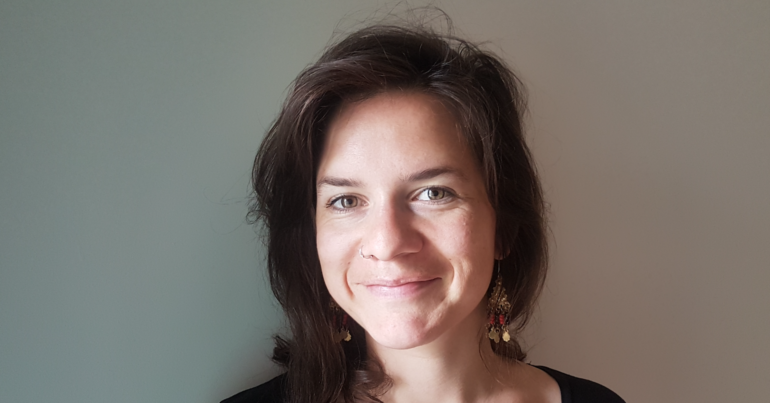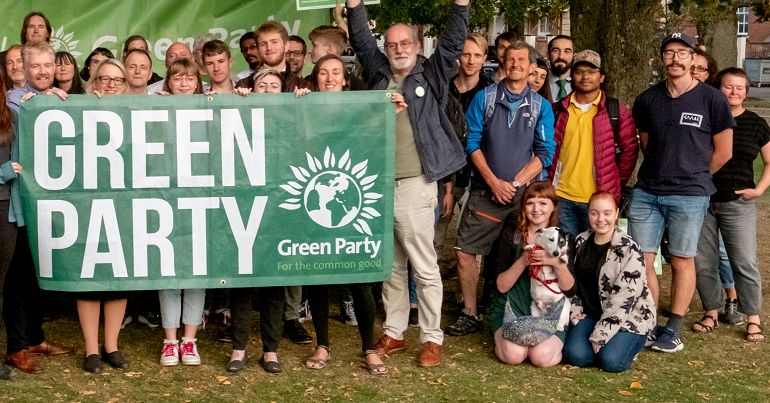Interview with Julia Lagoutte – Publications coordinator candidate for GPEx
 Throughout August, members of the Green Party for England & Wales will be voting to elect members of the next Green Party Executive (GPEx). In all, members will vote to determine which representatives will carry out eleven different roles – including that of leader and deputy leader. There is also a ballot to determine who will be the party’s third member in the House of Lords should the party be asked to put forward another peer.
Throughout August, members of the Green Party for England & Wales will be voting to elect members of the next Green Party Executive (GPEx). In all, members will vote to determine which representatives will carry out eleven different roles – including that of leader and deputy leader. There is also a ballot to determine who will be the party’s third member in the House of Lords should the party be asked to put forward another peer.
Julia Lagoutte (co-host of the Green Big Politics Podcast, and writer & editor for the Green European Journal) is set to stand for the role of publications co-ordinator. This month she expects to face Daniel Keeling (former co-chair of the Young Greens’ Senate, and current chair of the Newham Green Party), and Jack Lenox (former GPEx internal communicators co-ordinator).
We asked each of the candidates five questions on their background and what they would seek to achieve on GPEx. Here are Julia’s responses.
What do you think are the main challenges currently facing the Green Party, and how would you work to overcome them?
I would summarise our main challenges as the electoral system, public perception, and internal cohesion.
But I’m optimistic about the next few years, and we have seen in elections around the world that there is an appetite for Green parties – not just our policies but also our way of doing politics. Occupy, XR, Black Lives Matter, and now #Buildbackbetter are just some examples of how people want to be part of deciding the future we build. We must take advantage of this goodwill, and the exasperation with politics as usual, and that is why I am standing for GPEx.
Our electoral system is a major stumbling block, but we have 4 years to support organisations like ‘Make Votes Matter’ and build bridges to ensure that progressive parties (who represent the majority of the population) find a way of replacing the Tories at the next election. Standing down for other parties without reciprocation only makes real cooperation less likely, and we must be proactive and mature, and not afraid to be assertive. It is only when we show that we won’t work with other parties unless they work with us, that they will actually take that step. Unless progressive parties cooperate on this, the Conservative Party will have free reign to continue cementing the power of the wealthy and inequality, rolling back our democracy, and accelerating environmental destruction.
Internal cohesion – this is something I hear from many Greens, have witnessed myself, and have heard from prospective members as an obstacle to being involved. The lack of debate over the past few years, and the inability of some in leadership positions to hold the space we need to start healing, have hampered the way we relate to and support each other, leaving some members feeling alienated and unhappy. I’ve seen the effects in myriad ways, not least the way we are perceived outside the party and worrying numbers of committed volunteers fading away. Solidarity, respect and open-heartedness are key to activism and politics. It’s essential that we can engage within the party in good faith with each other – and recognise that as greens we have more that unites us than divides us. It’s time for GPEx to step up, facilitate discussion, create purpose and direction, and build community.
Public perception – Most voters know about the Green Party but many wouldn’t consider voting Green. Getting into local government and councils around the country is crucial not only to normalising Greens being everywhere, and doing good work as credible politicians, but also because such important decisions are taken at local level, and we can demonstrate our grassroots collaborative style. Changing public perception also means being genuinely diverse in terms of ethnicity, class, disability and more – and taking this seriously in terms of opportunities and support.
I would support GPEx to work efficiently and with the interests of the party as a whole in mind. I would like to use our publications to foster a space (through Green World) for the debates that we need to have to grow and to heal (interpersonally and as a party), and bolster a sense of community. It can also help build the alliances/bridges we need to push for PR and read on for more!
What skills do you bring that would make you an effective member of the executive?
I’ve worked in high-pressure political teams in publications, in political election campaigns, and in the office of Molly Scott Cato MEP office for 18 months. I’ve volunteered in various positions from small parties in rural areas to powerful city parties, from setting up university societies to leafleting and canvassing, supporting candidates and comms teams during elections, and managing social media accounts. I’ve been a Green for 10 years, and I understand Party structures and procedures, their strengths and weaknesses.
I’m an editor, writer and podcaster (Big Green Political Podcast) and was editorial assistant at the Green European Journal. I’m a natural collaborator and am committed to working positively with others, regardless of differences of opinion.
What would be your key priorities as publications coordinator?
Making our manifestos outward-looking, professional and engaging, and supporting local parties to develop their own materials, based around their particular local needs and issues. These resources are invaluable to enable our candidates and activists to speak to voters’ needs and priorities.
A print edition of Green World would be a key aim – more on that in the next question.
Given the work that goes into Green World, it should be sitting in kitchens, cafés and student unions around the country. To make the content go further and reach more people I would propose a podcast, a stronger social media strategy and a printed edition.
I would want to provide a safe forum for respectful and civil internal debates. We must overcome the unreasonable and personal nature of the way we relate to each other on some topics.
How would you improve Green World?
Three ideas: printed edition, social media boost, podcast.
I want Green World to be a space where we can connect, learn from and be inspired by each other, and contribute to a cohesive and supportive community. It can also elevate and support those who are under-represented in our party and be part of making the Green Party more genuinely diverse.
We invest money in making sure Green World has reliable, high-quality content. Now, we need to make sure the budget is spent wisely to maximise its use as a tool in turning supporters into members and members into activists, strengthening us as a party, and making us more effective as politicians and activists..
A printed edition gives something back to hard-working members and makes them more connected and engaged with the wider party – and gives them examples of real green wins in a format that is easy to share with friends and family. It’s a way for members to hear green analysis by our experts and spokespeople, develop our understanding of topical issues, and communicate the green perspective. It also reaches members who are less connected to social media. And why not have a Green World podcast? – to reach out still further, and be more accessible? I would also want to develop an improved social media strategy to share our excellent content and establish links with publications around the world.
This interview is part of a series with each of the candidates in this year’s GPEx elections. You can find Bright Green’s full coverage of the elections here.
PS. We hope you enjoyed this article. Bright Green has got big plans for the future to publish many more articles like this. You can help make that happen. Please donate to Bright Green now.



Leave a Reply